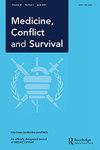诊断第一次世界大战期间德国的异议、歇斯底里、逃兵和出于良心拒服兵役者
Q3 Medicine
引用次数: 0
摘要
包括气候变化在内的原因。建议包括“从根本上重新思考导致如此高排放的信念”(234),同时建立在迄今为止美国军队的削减、创新和提高效率的基础上。继续保护波斯湾石油供应的论点实际上受到了挑战。详细介绍了以缓解为目标大幅减少排放带来的积极影响。为了帮助解决这个主题的复杂性,每一章都有一个有用的引言和总结。引用语的广泛使用为众多参与者中的一些人发声。经过如此令人印象深刻的阅读,最后一章感觉有点仓促,不那么清晰,在一些地方也不那么客观,这使得证据的陈述如此令人信服。鉴于本书分析和建议的整体重要性和优势,这只是一个小小的批评。无论你想了解排放计算的细节,尽管采取了平行的行动来减少排放,但仍努力不报告排放,美国军队和政府在国家安全方面的持续心态,他们在气候变化方面陷入的负面行为循环,以及他们应该做些什么,这都是一本重要的书。希望将军们和政治家们也能读到。本文章由计算机程序翻译,如有差异,请以英文原文为准。
Diagnosing dissent, hysterics, deserters, and conscientious objectors in Germany during World War One
causes including climate change. Recommendations include a ‘fundamental rethinking of the beliefs that have led to such high emissions’ (234) while building on the reductions, innovations and increased efficiency of the US military to date. The arguments for continuing to protect oil supplies in the Persian Gulf are effectively challenged. The positive spin-offs from a significant reduction in emissions carried out with the objective of mitigation are detailed. To help with the complexity of the subject, each chapter has a helpful introduction and concluding summary. An extensive use of quotes gives voice to some of the many actors involved. After such an impressive read, the final chapter feels a little rushed, with a bit less clarity and in a few places a little less of the objectivity that has made the presentation of evidence so convincing. This is a minor criticism given the overall importance and strengths of this book’s analysis and recommendations. Whether you want to understand the detail of emissions calculations, efforts not to report them despite parallel actions to reduce them, the ongoing mindset of the US military and government in relation to their national security, the negative behavioural loops they have got into in relation to climate change and what they should do differently – this is an essential book. Hopefully, the generals and politicians will read it too.
求助全文
通过发布文献求助,成功后即可免费获取论文全文。
去求助
来源期刊

Medicine, Conflict and Survival
Medicine-Pathology and Forensic Medicine
CiteScore
1.80
自引率
0.00%
发文量
46
期刊介绍:
Medicine, Conflict and Survival is an international journal for all those interested in health aspects of violence and human rights. It covers: •The causes and consequences of war and group violence. •The health and environmental effects of war and preparations for war, especially from nuclear, radiological, chemical and biological weapons of mass destruction. •The influence of war and preparations for war on health and welfare services and the distribution of global resources . •The abuse of human rights, its occurrence, causes and consequences. •The ethical responsibility of health professionals in relation to war, social violence and human rights abuses. •Non-violent methods of conflict resolution.
 求助内容:
求助内容: 应助结果提醒方式:
应助结果提醒方式:


